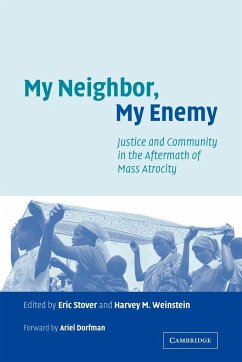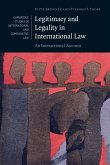Explores the effects of war-crime trials and how societies rebuild after ethnic cleansing and genocide.
My Neighbour, My Enemy tackles a crucial and highly topical issue - how do countries rebuild after ethnic cleansing and genocide? And what role do trials and tribunals play in social reconstruction and reconciliation. By talking with people in Rwanda and the former Yugoslavia and carrying out extensive surveys, the authors explore what people think about their past and the future. Their conclusions controversially suggest that international or local trials have little relevance to reconciliation. Communities understand justice far more broadly than it is defined by the international community and the relationship of trauma to a desire for trials is not clear-cut. The authors offer an ecological model of social reconstruction and conclude that coordinated multi-systemic strategies must be implemented if social repair is to occur. Finally, the authors suggest that while trials are essential to combat impunity and punish the guilty, their strengths and limitations must be acknowledged.
Table of content:
List of contributors; Foreword Ariel Dorfman; Acknowledgments; Introduction: conflict, justice and reclamation Harvey M. Weinstein and Eric Stover; Part I. Institutional Approaches to Justice: Introduction; 1. A world unto itself? The application of international justice in the former Yugoslavia Laurel E. Fletcher and Harvey M. Weinstein; 2. Legal responses to genocide in Rwanda Alison des Forges and Timothy Longman; 3. Localizing justice: gacaca courts in post-genocide Rwanda Urusaro Alice Karekezi, Alphonse Nshimiyimana and Beth Mutamba; 4. Exhumation of mass graves: balancing legal and humanitarian needs Eric Stover and Rachel Shigekane; 5. Witnesses and the promise of justice in The Hague Eric Stover; 6. Reparations in the aftermath of repression and mass violence Naomi Roht-Arriaza; Part II. Social Reconstruction and Justice: Introduction; 7. Neighbors again? Intercommunity relations after ethnic cleansing Dinka Corkalo, Dean Ajdukovic, Harvey M. Weinstein, Eric Stover, Dino Djipa and Miklos Biro; 8. Memory, identity, and community in Rwanda Timothy Longman and Théonèste Rutagengwa; 9. Attitudes toward justice and social reconstruction in Bosnia and Herzegovina and Croatia Miklos Biro, Dean Ajdukovic, Dinka Corkalo, Dina Djipa, Petar Milin and Harvey M. Weinstein; 10. Connecting justice to human experience: attitudes toward accountability and reconciliation in Rwanda Timothy Longman, Phuong Pham and Harvey M. Weinstein; 11. Public education and social reconstruction in Bosnia and Herzegovina and Croatia Sarah Warshauer Freedman, Dinka Corkalo, Naomi Levy, Dino Abazovic, Bronwyn Leebaw, Dean Ajdukovic, Dino Djipa and Harvey M. Weinstein; 12. Confronting the past in Rwandan schools Sarah Warshauer Freedman, Déo Kambanda, Beth Lewis Samuelson, Innocent Mugisha, Immaculée Mukashema, Evode Mukama, Jean Mutabaruka, Harvey M. Weinstein and Timothy Longman; Part III. Survivors and Justice: Introduction; 13. Art out of the rubble Pamela Blotner; 14. Trust and betrayal in war Dean Ajdukovic and Dinka Corkalo; 15. Empathy and rehumanization after mass violence Jodi Halpern and Harvey M. Weinstein; Conclusion: a common objective, a universe of alternatives Eric Stover and Harvey M. Weinstein; Index.
Hinweis: Dieser Artikel kann nur an eine deutsche Lieferadresse ausgeliefert werden.
My Neighbour, My Enemy tackles a crucial and highly topical issue - how do countries rebuild after ethnic cleansing and genocide? And what role do trials and tribunals play in social reconstruction and reconciliation. By talking with people in Rwanda and the former Yugoslavia and carrying out extensive surveys, the authors explore what people think about their past and the future. Their conclusions controversially suggest that international or local trials have little relevance to reconciliation. Communities understand justice far more broadly than it is defined by the international community and the relationship of trauma to a desire for trials is not clear-cut. The authors offer an ecological model of social reconstruction and conclude that coordinated multi-systemic strategies must be implemented if social repair is to occur. Finally, the authors suggest that while trials are essential to combat impunity and punish the guilty, their strengths and limitations must be acknowledged.
Table of content:
List of contributors; Foreword Ariel Dorfman; Acknowledgments; Introduction: conflict, justice and reclamation Harvey M. Weinstein and Eric Stover; Part I. Institutional Approaches to Justice: Introduction; 1. A world unto itself? The application of international justice in the former Yugoslavia Laurel E. Fletcher and Harvey M. Weinstein; 2. Legal responses to genocide in Rwanda Alison des Forges and Timothy Longman; 3. Localizing justice: gacaca courts in post-genocide Rwanda Urusaro Alice Karekezi, Alphonse Nshimiyimana and Beth Mutamba; 4. Exhumation of mass graves: balancing legal and humanitarian needs Eric Stover and Rachel Shigekane; 5. Witnesses and the promise of justice in The Hague Eric Stover; 6. Reparations in the aftermath of repression and mass violence Naomi Roht-Arriaza; Part II. Social Reconstruction and Justice: Introduction; 7. Neighbors again? Intercommunity relations after ethnic cleansing Dinka Corkalo, Dean Ajdukovic, Harvey M. Weinstein, Eric Stover, Dino Djipa and Miklos Biro; 8. Memory, identity, and community in Rwanda Timothy Longman and Théonèste Rutagengwa; 9. Attitudes toward justice and social reconstruction in Bosnia and Herzegovina and Croatia Miklos Biro, Dean Ajdukovic, Dinka Corkalo, Dina Djipa, Petar Milin and Harvey M. Weinstein; 10. Connecting justice to human experience: attitudes toward accountability and reconciliation in Rwanda Timothy Longman, Phuong Pham and Harvey M. Weinstein; 11. Public education and social reconstruction in Bosnia and Herzegovina and Croatia Sarah Warshauer Freedman, Dinka Corkalo, Naomi Levy, Dino Abazovic, Bronwyn Leebaw, Dean Ajdukovic, Dino Djipa and Harvey M. Weinstein; 12. Confronting the past in Rwandan schools Sarah Warshauer Freedman, Déo Kambanda, Beth Lewis Samuelson, Innocent Mugisha, Immaculée Mukashema, Evode Mukama, Jean Mutabaruka, Harvey M. Weinstein and Timothy Longman; Part III. Survivors and Justice: Introduction; 13. Art out of the rubble Pamela Blotner; 14. Trust and betrayal in war Dean Ajdukovic and Dinka Corkalo; 15. Empathy and rehumanization after mass violence Jodi Halpern and Harvey M. Weinstein; Conclusion: a common objective, a universe of alternatives Eric Stover and Harvey M. Weinstein; Index.
Hinweis: Dieser Artikel kann nur an eine deutsche Lieferadresse ausgeliefert werden.








